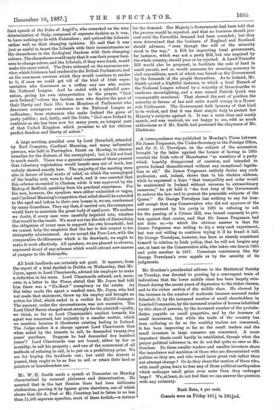A correspondence was published in Monday's Times between Sir James
Fergusson, the Under-Secretary to the Foreign Office, and Sir G. 0. Trevelyan, on the subject of the accusation brought by the latter against the former of having in 1885 courted the Irish vote of Manchester "as members of a party which heartily disapproved of coercion, and intended to govern Ireland thenceforward without any exceptional legisla- tion at all." Sir James Fergusson entirely denies any such profession, and, indeed, shows that in his election address, while he expressed a hope "that tranquillity and order would be maintained in Ireland without recourse to extraordinary measures," he yet held it "the first duty of the Government to enforce the law, and to protect the peaceable subjects of the Queen." Sir George Trevelyan has nothing to say for him- self except that any Conservative who did not approve of the course pursued by his party in 1 5 in refusing to ask for the passing of a Crimes Bill, was bound expressly to pro. test against that course, and that Sir James Fergusson had not done so,—to which the obvious answer is that Sir James Fergusson was willing to try a very rash experiment, but was not willing to continue trying it if he found it fail. Sir George Trevelyan, however, has been so sternly consistent himself in relation to Irish policy, that he will not forgive any, one, at least on the Conservative side, who takes one line in 1 5 and quite another in 1887. Conscious consistency like Sir George Trevelyan's even appals us by the severity of its judgments.






















































 Previous page
Previous page